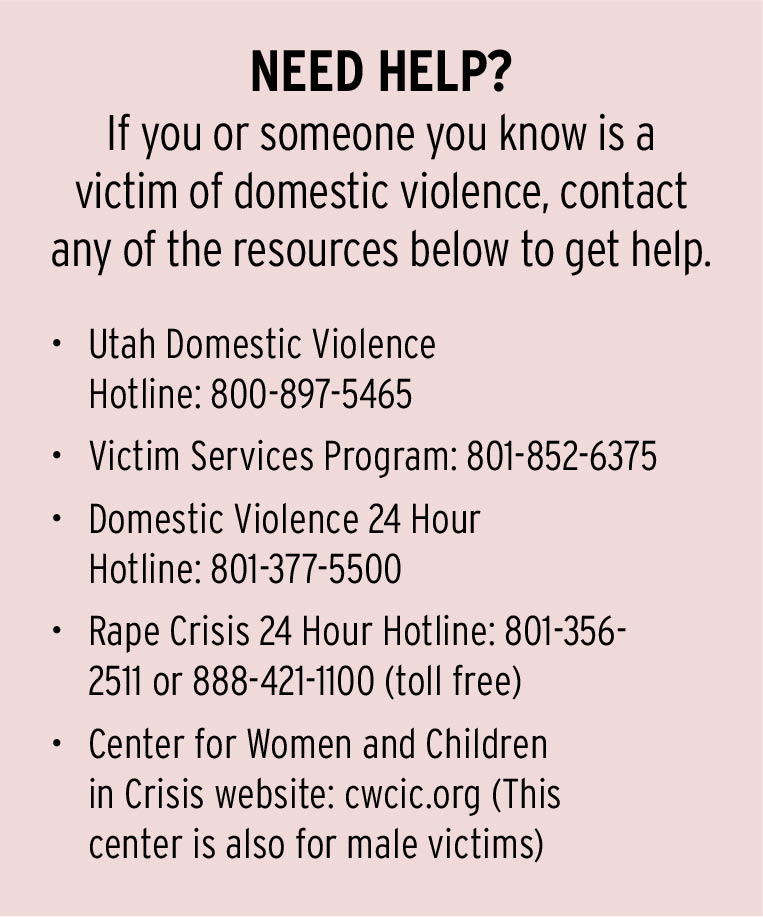
Every nine seconds a woman becomes a victim of physical domestic violence, according to Domestic Shelters. Every 15 seconds a man is a victim of domestic violence.
October is Domestic Violence Awareness month. This month is dedicated to promoting “community awareness on victimization issues and the effects it has on our community,” according to Provo Police Department victim services coordinator Kortney Hughes. More than one-third of Americans have not talked about domestic violence with friends and family members. Hughes said the month also helps victims know they are not alone.
Domestic Shelters — a website that shows the latest domestic violence statistics, maps nearest shelters and gives advice on what victims should do — estimates one in four women and one in seven men are recipients of domestic violence in their lifetime, although unreported incidents could alter this statistic.
Amanda Burke, shelter director of the Center for Women and Children in Crisis, defined domestic violence as violence in any relationship — when someone uses power or control over the other person. This abuse can be physical, verbal, sexual, economic or psychological.
BYU licensed psychologist Barbara Morrell said manipulation is often overlooked as a form of psychological abuse. Manipulation is used to control or gain power over another person to get what the manipulator wants.
“A relationship cannot be healthy if one person is trying to dominate the other,” Morrell said.
Burke said emotional abuse is the No. 1 form of abuse among the victims she’s met.
Patterns of abuse can show up earlier or later in a relationship. Partners, family members and friends should try to notice the signs and say something, according to Morrell.
“There can be a lot of red flags that may or may not designate a bigger problem,” Morrell said.
She said one of the things that can happen is an individual is supportive and complimentary at first, but “over time there begins to be statements made that are very critical, or demeaning, or mocking in some way.”
Burke said it is important to set and respect boundaries in a relationship. Deliberately breaking those boundaries, not caring or not listening to them is a sign of abuse.
“Boundaries are so important within a relationship,” Burke said. “We all know what a boundary is, but we don’t talk about it very often.”
Burke said other red flags include nonstop contact, often by phone, wanting to know where the person is at all times, not letting the person see certain friends or go to certain places, or an increased amount of jealousy.
“We look at that as not just regular jealousy, we all get jealous, but that may be going into controlling,” Burke said.
Morrell has also worked with male victims of domestic abuse within both dating and married relationships.
“One of the complexities of domestic violence is that in a typical relationship, the man might be more physically powerful,” Morrell said. “But I have talked to men whose partners exerted a lot of emotional violence; a lot of yelling and screaming insults and attacking the man, even physically sometimes. This can lead to feelings of helplessness.”

While it may seem easy to leave an abusive relationship to those who are not in one, there are many reasons why people stay, according to Morrell. Often they feel a deep level of commitment, sometimes due to spiritual beliefs.
The individual may feel guilt or shame, or believe he or she has done something to deserve the treatment. Some justify it or think it is normal because they grew up with violence in their own home.
Hughes, Morrell and Burke all urge victims to use resources available to them.




